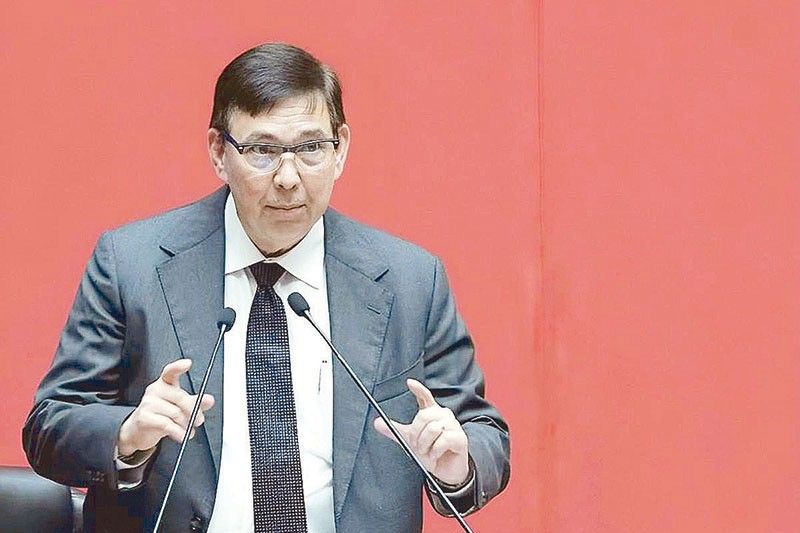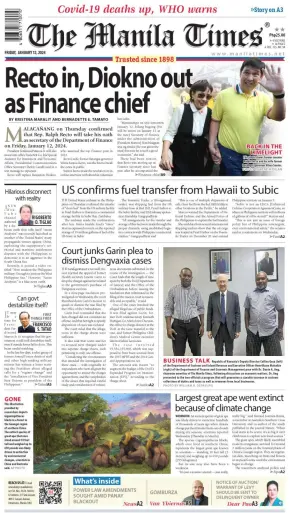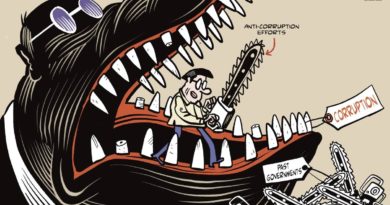Ano Ba Talaga Kuya?-Recto, Marcos Wealth Caretaker | Diokno out; Recto named DOF chief
Ano Ba Talaga Kuya?-Recto, Marcos Wealth Caretaker? | Diokno out; Recto named DOF chief
- Diokno will be fulltime na sa Maharlikato manage Marcos Family hidden wealth now in the Philippines to invest in NGCP ?
.
.
—————————-

HEADLINE
Diokno out; Recto named DOF chief

Rep. Ralph Recto, currently a House deputy speaker, is set to take his oath before President Marcos today as the new secretary of the Department of Finance./ STAR / File
.
Recto in, Diokno out as Finance chief
.

MANILA, Philippines — House Deputy Speaker Ralph Recto is taking over the post of Benjamin Diokno as finance secretary and head of the administration’s economic team.
Sources confirmed that Recto is set to take his oath before President Marcos today as the new head of the Department of Finance (DOF).
Diokno, in turn, will take his oath before Bangko Sentral ng Pilipinas (BSP) Governor Eli Remolona as the last member of the seven-man Monetary Board.
Sought for confirmation, Presidential Communications Secretary Cheloy Garafil said an announcement would be made “in due time.”
Ahead of a formal announcement from Malacañang, veteran actress and former Batangas lawmaker Vilma Santos-Recto confirmed the appointment of her husband as head of the economic team.
The appointment came on Recto’s 60th birthday yesterday following rumors over the appointment of a new Cabinet official.
With Recto’s assumption of the top DOF post, the moniker BEAM Team (Ben-Eli-Arsi-Mina) will be replaced with REAM Team (Ralph-Eli-Arsi-Mina), referring to the other members of the economic team: BSP’s Remolona, Socioeconomic Planning Secretary Arsenio Balisacan and Budget Secretary Amenah Pangandaman.
Recto’s House colleague Rep. Joey Salceda, meanwhile, welcomed the “likely appointment” of the Batangas first district representative.
“I welcome the likely appointment of fellow tax reformer Rep. Ralph Recto as Finance Secretary,” Salceda, chairman of the House ways and means committee, said in a statement.
“He brings in a wealth of experience in economic legislation and deep and longstanding relationships with members of Congress. This experience and network will be crucial in enacting meaningful reforms to address cost of living, create employment, and expand our fiscal space,” he said.
Recto chaired the Senate committee on ways and means and was one of the authors of the 1997 Comprehensive Tax Reform Program during his tenure in the House.
“I am optimistic that key tax reforms pending in the Senate will also move faster with his appointment, due to his relationships in that chamber, as well as his ability to broker viable compromises,” Salceda said.
While officials of the economic team and their subordinates have chosen to be mum on the development, most of them have expressed sadness over the latest DOF shakeup.
One source lamented Diokno’s exit from the DOF saying he had been doing a good job, while another dismissed it as an exercise of presidential prerogative.

Another source said Diokno’s being given a new post may have been triggered by his initial pronouncements on the rice price cap issue in September last year.
Diokno earlier admitted that the economic team was not consulted when Malacañang imposed a cap on rice price, and suggested that it not be allowed to last long as it cannot be sustained. A day later, Diokno clarified he was supportive of the Palace decision.
An economist said the issue now is how Recto will address debt and taxes as head of the administration’s economic team.
Another economist has expressed concerns over how Recto would carry out fiscal consolidation amid high budget deficit and rising debt level. The same economist said it’s best for the government to rely more on sin taxes so as not to burden Filipino consumers already reeling from high inflation.
The Marcos administration is still dealing with a relatively limited fiscal space amid the lingering impact of the pandemic. Under such scenario, economists are in agreement that new taxes, not just reforms, are needed to generate the needed revenues and bring back the economy to a high-growth trajectory.

Under Diokno, the government was banking on the passage of the previous administration’s remaining tax reforms on passive income and financial intermediaries taxation, and real property valuation and assessment.
Among the government’s priority measures are excise tax on single use plastics, value added tax on digital services, rationalization of the mining fiscal regime, motor vehicle user’s charge, and the proposed reform of the pension system for military and uniformed personnel. – Delon Porcalla, Alexis Romero











